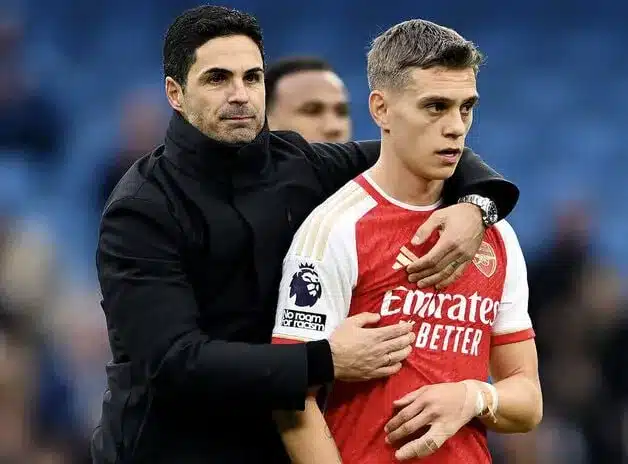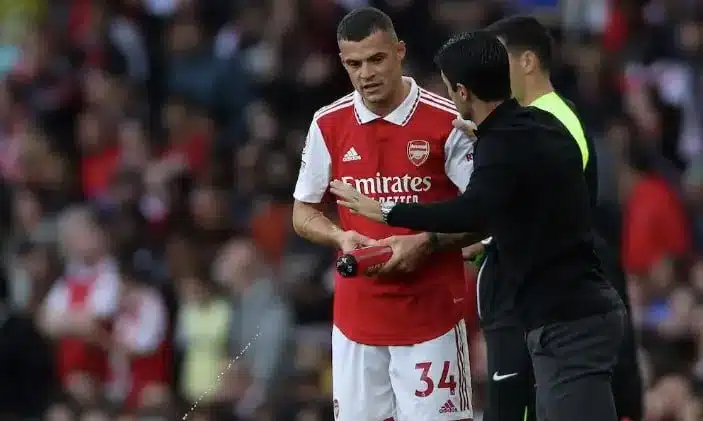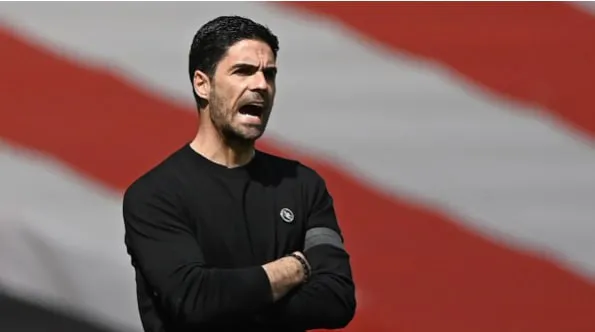The Emirates Stadium witnessed a footballing lesson on Sunday, one that newly-appointed Arsenal manager Mikel Arteta watched from an uncomfortably close vantage point. From the Manchester City bench, the former Gunners captain saw his future team’s deep-seated issues laid bare in a comprehensive 3-0 defeat. The performance highlighted defensive fragility, midfield disorganization, and a palpable lack of confidence that has become synonymous with Arsenal’s recent struggles. For Arteta, the challenge isn’t merely about improving results—it’s about implementing a complete philosophical overhaul at a club that has lost its identity.
Arteta observed Arsenal’s weaknesses firsthand from Pep Guardiola’s coaching staff
The Scale of the Challenge
Arsenal’s current predicament represents their most significant crisis in the Premier League era. The statistics paint a troubling picture: the club has conceded more goals after 17 games than in any previous season, maintains a negative goal difference for the first time at this stage, and finds themselves as close to the relegation zone as to the Champions League places. This isn’t merely a dip in form—it’s a systemic failure that requires immediate addressing.
Former Liverpool defender and Krikya analyst Jamie Carragher pinpointed the fundamental issue: “Every time I watch them play, when the ball comes in on the attack, they just drop off. They drop off when they should press, they press when they should drop off. It’s like they don’t know what they’re doing.” This tactical confusion has become Arsenal’s trademark under both Unai Emery and interim manager Freddie Ljungberg.
Defensive Reorganization: The Immediate Priority
Arteta‘s first and most crucial task will be implementing defensive structure and discipline. At Manchester City, he worked with one of the most organized defensive units in world football, despite their attacking reputation. At Arsenal, he inherits a backline that appears fundamentally confused about basic defensive principles.
The problem extends beyond the back four. Arsenal’s midfield offers minimal protection, with massive gaps appearing between lines that top opponents like Manchester City exploit ruthlessly. Kevin De Bruyne’s dominant performance against Arsenal highlighted how easily opponents can penetrate the heart of their defense without facing significant resistance.

The Midfield Conundrum
Arteta faces particular challenges in midfield, where he lacks a natural defensive organizer. At City, he had the luxury of working with Fernandinho, arguably the Premier League’s best holding midfielder over the past five years. At Arsenal, his options include Granit Xhaka (who lacks the mobility for the role), and younger players like Lucas Torreira and Matteo Guendouzi who show promise but remain tactically raw.
According to Michael Cox, tactical analyst for The Athletic, “Arsenal’s midfield malfunction might be an even bigger issue than their defense. The lack of coordination between pressing triggers and defensive shape creates vulnerabilities that any organized opponent can exploit.” Arteta must quickly establish clear tactical instructions and develop the positional awareness of his young midfielders.
Attacking Recalibration
While defensive issues demand immediate attention, Arteta also faces significant challenges in attack. Interim manager Freddie Ljungberg quickly determined that playing both Pierre-Emerick Aubameyang and Alexandre Lacazette together compromised defensive balance. Additionally, the £72 million signing Nicolas Pepe has struggled to adapt to the Premier League, while Mesut Özil’s role remains undefined despite his obvious creative talents.
The contractual situations of Aubameyang and Lacazette further complicate matters, with both entering the final years of their deals next summer. Arteta must not only determine his optimal attacking configuration but also convince his star players to commit their futures to the club.
Arteta learned from one of football’s greatest minds during his time at Manchester City
Reasons for Optimism
Despite the considerable challenges, several factors suggest Arteta might be the right man for this daunting task. First, Arsenal boasts an exciting crop of academy graduates including Joe Willock, Bukayo Saka, and Emile Smith Rowe, all of whom have shown promise when given opportunities. Additionally, the emergence of Gabriel Martinelli and the impending arrival of William Saliba next summer provide genuine reasons for optimism.
Perhaps most importantly, Arteta’s return generates significant goodwill among supporters who remember his leadership as club captain. His understanding of Arsenal’s culture and values cannot be underestimated in a project that requires complete buy-in from all stakeholders.
Moreover, after the confused tactical messaging of Unai Emery’s tenure, Arsenal currently lacks any identifiable playing philosophy. This clean slate might actually benefit Arteta, providing him with the opportunity to implement his ideas without having to undo an established but flawed system.
The Road Ahead
Arteta‘s vision for “expressive” and “entertaining” football aligns with Arsenal’s historical identity, but he must balance this with the pragmatic needs of a team that has forgotten how to defend. The January transfer window will provide his first opportunity to shape the squad, though the imbalanced nature of the current roster raises questions about the club’s recruitment strategy.
The fundamental question remains: are Arsenal’s decision-makers prepared to support Arteta adequately, even if the club faces a fourth consecutive season outside the Champions League? Last summer’s investment in players like Pepe suggests ambition, but consistent backing will be necessary to bridge the considerable gap between Arsenal and the Premier League’s elite.

Mikel Arteta’s Arsenal Revolution: A Tactical Blueprint for the Future
The journey ahead for Mikel Arteta and Arsenal represents one of the most fascinating projects in modern football. The Spaniard brings tactical wisdom learned from Pep Guardiola, an understanding of the club’s culture, and the boldness to undertake a monumental rebuilding job. While immediate improvement is expected, the real test will be whether he can implement a coherent playing philosophy that returns Arsenal to their rightful place among England’s elite.
For Krikya readers and Arsenal supporters worldwide, the Arteta era promises tactical innovation, renewed identity, and hopefully—in time—the return of winning football to the Emirates Stadium. The road will be long and challenging, but for the first time in years, there appears to be a clear vision for how Arsenal might rediscover their greatness.
What are your expectations for Mikel Arteta’s Arsenal? Which areas should be prioritized for improvement? Share your thoughts with the Krikya community below.

